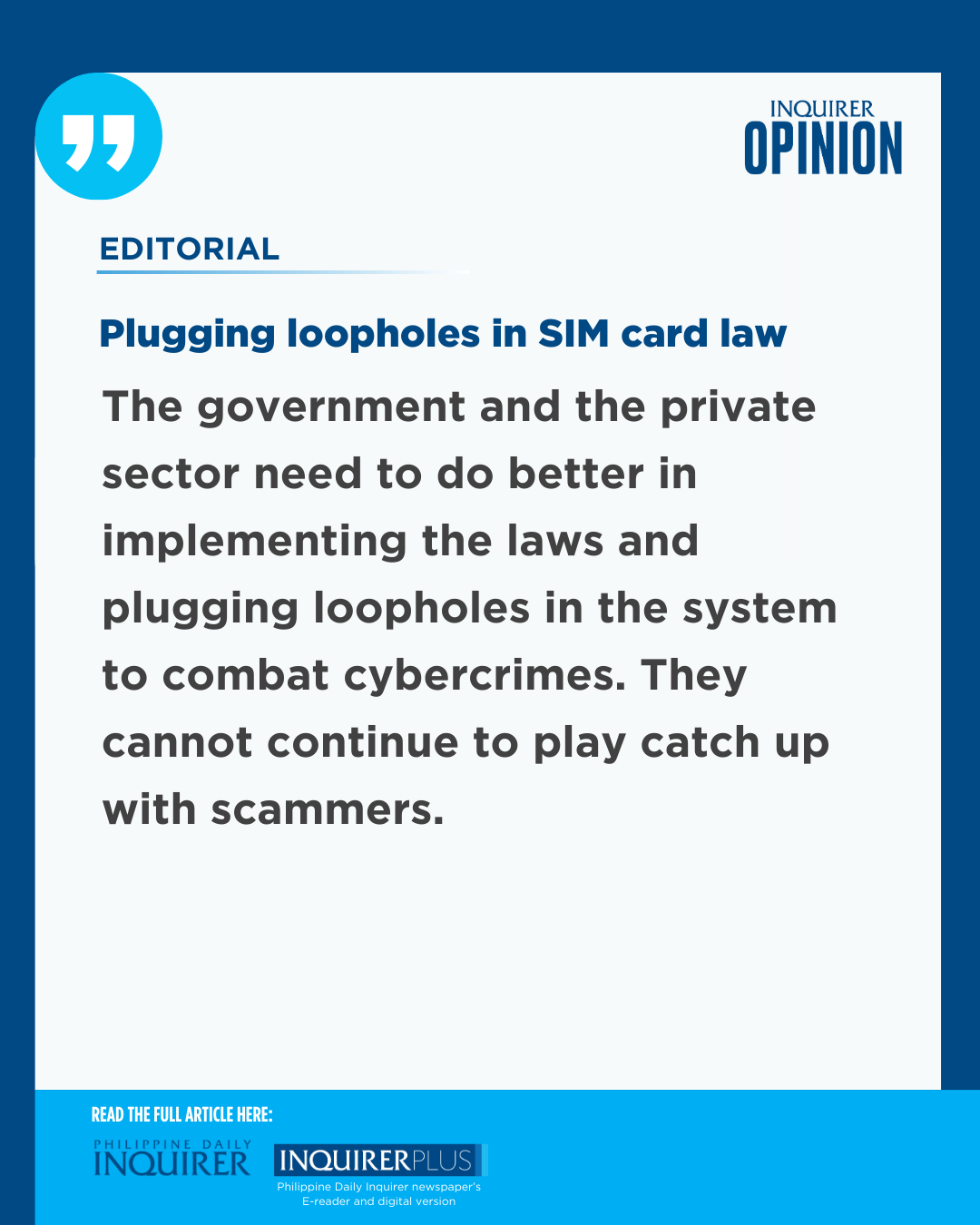The Subscriber Identity Module (SIM) Registration Act was passed in 2022 and the Philippine offshore gaming operators (Pogos) that spawned many crimes were banned effective end of last year. And yet, too many Filipinos are still being hounded by scam calls cleverly designed to defraud them of their hard-earned money.
Sen. Grace Poe, one of the authors of Republic Act No. 11934, said such a “dramatic increase” in scam calls observed during the first quarter of the year was “disturbing,” to say the least.
She was referring to fraudsters’ odious scheme of sending spurious emails or other messages supposedly coming from reputable companies to trick individuals into revealing sensitive personal information — such as passwords and credit card numbers—that can be used to access their financial accounts.
The SIM Registration Act was supposed to help curb these scams by requiring registration of SIM cards, on the premise that by attaching these SIM cards to real people, it would be easier to identify those behind numbers being used to commit these crimes and easier to prosecute them.
At the same time, these criminals will be prevented from using unregistered or anonymous numbers for fraudulent activities as some Pogos had been suspected of doing.
But challenges in the implementation of the SIM Registration Act gave a large space for wily fraudsters to operate and continue victimizing unsuspecting Filipinos who were lulled into the false sense of security. Some, for example, were still able to register SIM cards under false names using fake IDs. Others, on the other hand, chose to sell their registered their SIM cards to criminal elements for a handsome fee.
Vulnerable to fraud
These are clear violations of the SIM Registration Act that should therefore not go unpunished. Under this law, those found selling registered SIMs face up to six years in jail and as much as P300,000 in fines.
The National Telecommunications Commission has called for face-to-face verification of identification cards before individuals can register the SIM cards on their mobile phone.
The NTC noted that the current registration process that requires only a photo and submission of some personal information and a copy of a government-issued ID card may be too lax and therefore vulnerable to fraud. Unscrupulous individuals exploit the system to sell their identities to others, it said.
This is similar to the personal appearance required for the granting or renewal of driver’s licenses and clearances from the National Bureau of Investigation and the Philippine National Police, a more tedious process that will require extra time and resources.
Telecommunications companies — which are key to the strict implementation of the SIM Registration Act — however opposed the idea as they claimed requiring face-to-face verification will just add a layer of bureaucracy that will further delay registration and make it harder for Filipinos in remote and rural areas to comply with the law. It will also cost more, they said.
Verified ID database
“The very essence of universal access is to provide connectivity to all Filipinos at the lowest possible price and the easiest way to get it. Requiring face-to-face registration will defeat this principle,” said Froilan Castelo, general counsel of telecommunications industry leader Globe Telecom Inc.
The Philippine Chamber of Telecommunication Operators instead suggested that the government put together a single, verified ID database that the telcos can rely on to validate the authenticity of SIM registrants.
The National ID system can perform that function, but then again that presents another set of problems due to multiple complaints of sub-quality plastic cards with faded images, rendering them practically useless as a means of verification, not to mention the long delay in the delivery of the IDs.
The Philippine Statistics Authority reported that as of March 31 this year, 93.1 million Filipinos have registered for their national ID, but then only 54.9 million cards had been delivered.
Plugging loopholes
An extensive review of the 3-year old SIM Registration Act is in order to see how it can be tweaked, strengthened or more easily implemented, guided by the lessons of the past three years since the landmark law was passed. This way, it will be able to fulfill its promise to keep the country a step ahead of fraudsters and minimize the damage to the public.
The Global Anti-Scam Alliance pointed out in an October 2024 report that Filipinos lost as much as $8.1 billion or nearly P640 billion over the past 12 months due to the scams that were mainly launched via text messages that Filipinos receive regularly as they conduct more of their personal and business transactions online.
Clearly, the government and the private sector need to do better in implementing the laws and plugging loopholes in the system to combat cybercrimes. They cannot continue to play catch up with scammers.


